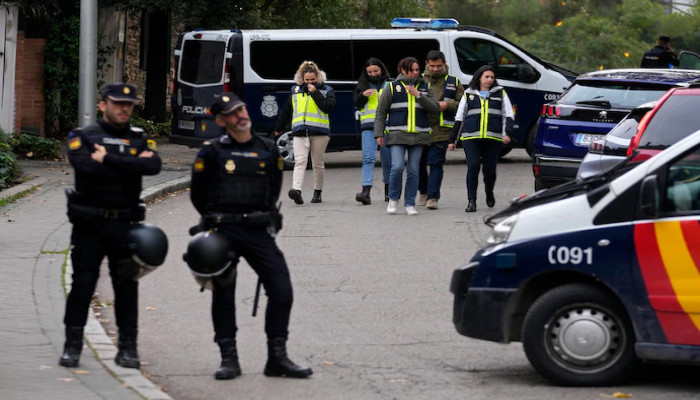Five letter bombs were detected in Spain. As a result, the country steps up security
MADRID, December 1 (Reuters)– Experts in bomb defusing defused a fifth letter bomb on Thursday as Spain increased security to combat a string of bombs sent to high-profile targets, including the prime minister and the ambassador to Madrid from Ukraine.
Early indications suggest that all five packages were sent from within Spain, the country's Deputy Interior Minister told journalists.
Rafael Perez, the lesser priest liable for the security, said the hand-crafted gadgets were sent in earthy-colored bundles containing an explosive powder and tripwire that would produce " unexpected blazes" instead of a blast.
The packages were address to the institutions 39; governing bodies.
Perez said one of the devices had detonate – injuring a security officer at the Ukrainian embassy in Madrid, the security forces fire three others in control explosions, and one had been kept intact for investigative purposes.
He stated that we are basing this on early visual inspections without a detailed technical report. However, it appears they were all sent from within the country.
Perez stated that it did not appear necessary then to convene the security committee to
evaluate increasing Spain's terrorist threat level, which is already at the second highest level after ten years of Islamist attacks in Europe.
The Interior Ministry said in a report that it had, however, ordered police to strengthen the security around public buildings and carefully check postal deliveries.
The devices were homemade, but they were not something anyone could make, according to a source close to the investigation. Now, investigators want to find out where the contents came from.
Spain’s High Court, which specializes in terrorism, has extended an investigation, a judicial source said.
ARMS FIRMS, EU SATELLITE CENTRE TARGETED
After police said that a security official at the Ukrainian embassy in Madrid had been slightly injure after open a package, news of the letter bombs spread on Wednesday lunchtime.
According to Pohoreltsev, he opened the box and heard a click, tossed it, and then heard the explosion. The commandant received a concussion and hurt his hands. We have guidelines from the service in Ukraine that, given the circumstance, we must be ready for an episode. For instance, Russian exercises outside the country, Pohoreltsev told Spanish TV channel TVE.
Nine months ago, in what Russia calls a special military operation, it invaded Ukraine, which Kyiv and the West characterize as an unprovoked, imperialist land grab.
A spokesperson for the Ukrainian ministry stated that Dmytro Kuleba, the country’s foreign minister, issued an order instructing Kyivs overseas embassies to urgently enhance security following the incident.
Thursday, the Russian Embassy in Spain condemned any threat or terrorist act regarding the five letter bombs, particularly directed at a diplomatic mission, in a tweet.
According to police, a second package was deliver to the headquarters of the Spanish weapons manufacturer Instalaza on Wednesday night in Zaragoza, in the northeast of Spain.
Instalaza makes the C90 missile launcher that Spain has given to Ukraine.
The defense ministry reported that early on Thursday, Spanish security forces discovered a device in an envelope addressed to a European Union satellite center at an air force base in Torrejon de Ardoz, near Madrid.
According to its website, the satellite center gathers data from space intelligence devices to support the EU’s standard foreign and security policy. EU Foreign Policy Chief Josep Borrell recently referred to it as a component of the eyes of Europe.
An envelope with pyrotechnic material addressed to Prime Minister Pedro Sanchez had been receive on November 24 and disarmed by his security team, Spain’s Interior Ministry revealed on Thursday morning. It stated that the gadget was similar to packages found this week.
A fifth device was receive at Spain’s Defence Ministry on Thursday morning and defused by specialist police officers, and a defense ministry spokesperson told Reuters.
Corina Rodriguez, Emma Pinedo, Belen Carreno, Juan Medina, Inti Landauro, and Jesus Aguado contributed to the reporting; Alison Williams and Alex Richardson edited the work Inti Landauro and Aislinn Laing wrote.



